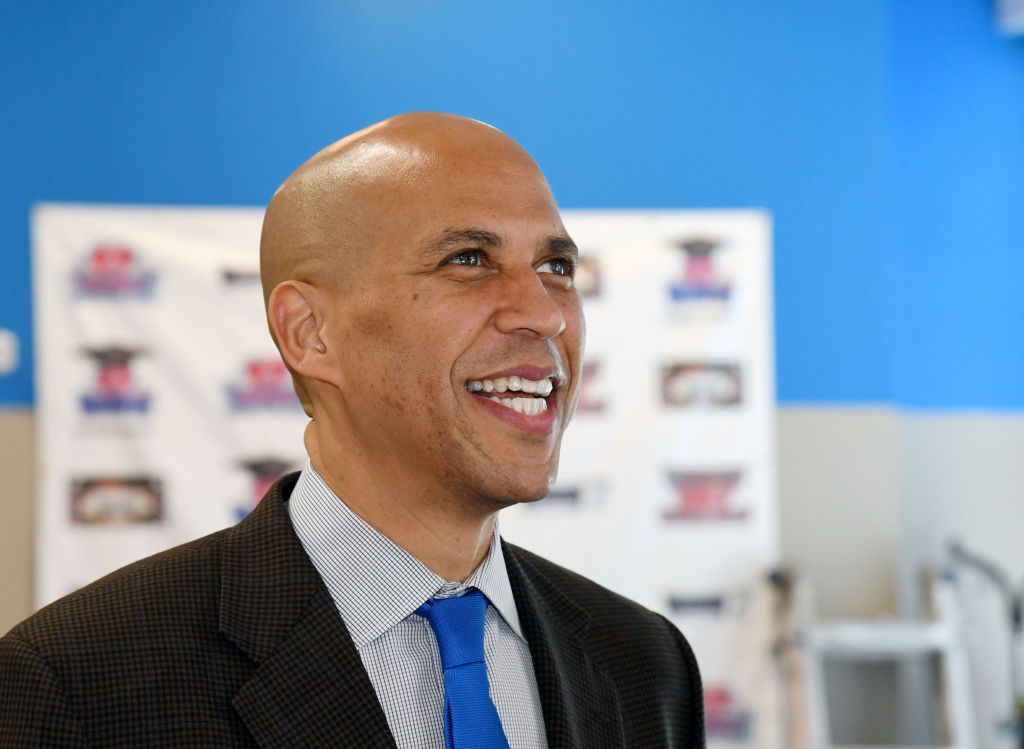The “Affordability” Hustle
Mainstream Democrats love to talk about making things like health care and education more affordable. They should be talking about making them free.

New Jersey senator Cory Booker visits Masterpiece Barber College as he campaigns for Nevada Democratic candidates on October 24, 2018 in Las Vegas, NV. Ethan Miller / Getty
From healthcare to education policy, the language of affordability is everywhere.
As the 2020 presidential race gets underway, we can expect phrases like “affordable access” to be at least as ubiquitous as references to the middle class or vague refrains about how there’s more that unites people than divides them, particularly from Democrats. The word “affordable” appeared some thirty-one times in the 2016 Democratic Party platform, in reference to policy areas ranging from housing and college tuition to childcare and finance (for comparison, “middle class,” that hallowed floating signifier, appeared only sixteen times).
Its omnipresence in political language makes a certain intuitive sense. Life for many Americans is, after all, dominated by institutions that make things more expensive by design: health insurers offering pricey packages for even the most basic coverage; telecom and energy giants imposing inscrutable new rates and fees on customers trying to maintain their cell service, keep the lights on, or not freeze to death in the winter; schools making themselves ever more exclusive through higher tuition; landlords raising the rents at each and every opportunity.
The rhetoric of affordability has become particularly pervasive in the field of health care, in no small part because of how the Obama administration opted to name its signature piece of domestic legislation (the “Affordable Care Act”). It’s so pervasive, in fact, that some current and prospective Democratic presidential hopefuls alike have taken to fusing it with the language of universality as the push for Medicare for All has gained momentum.
Just before announcing her presidential candidacy, California senator Kamala Harris declared: “A real national emergency is the fact that people die every day in America simply because they cannot afford medical care. Everyone deserves quality, affordable health care, which is why I support Medicare for All.”
To take another example, the language on Cory Booker’s official website states that “[the senator] believes that all Americans should have access to affordable, quality health care” (both Harris and Booker, to be fair, did co-sponsor Bernie Sanders’s Medicare-for-All bill in 2017, though Harris sounded less equivocal on the matter during a recent town hall).
Gradually walking back his initial support for single-payer legislation over the course of his recent Senate campaign, Beto O’Rourke first spoke of “universal, guaranteed, high-quality health care for all” before eventually amending this to “universal healthcare coverage…so that we can ensure everyone is able to see a provider when it will do the most good and will deliver healthcare in the most affordable, effective way possible.”
Their professed commitments to universality notwithstanding, the appearance of affordability rhetoric in statements like these should immediately set off alarm bells among those who truly support Medicare for All and its core principles. Obama himself, after all, was a nominal supporter of single-payer legislation back in 2003 despite ultimately enacting a market-friendly alternative upon entering the White House. And despite making some tangible improvements to the country’s infamously dysfunctional healthcare system (notably institutionalizing protections for people with preexisting conditions), the ACA is itself a good illustration of the conservative logic that tends to be implicit in the language of affordability.
Maintaining the private health insurance system, Obama’s signature piece of legislation made structurally modest changes while preserving the very thing at the root of the dysfunction: the existence of a marketplace and the profit mechanism at its core (ironically enough, given its branding, the ACA has also proven notably ineffective at actually bringing down costs).
Pushes to make vital public goods such as health care or education “affordable” — whether well-intentioned or deliberately misleading — still invariably imply a transaction taking place between a seller and a consumer: the dynamic of the market in its most elemental form. Even if the good in question does become cheaper (and therefore easier for more people to access), the basic dynamic is maintained and the good remains a commodity to be bought and sold rather than a universal right to be guaranteed and enjoyed.
This is what makes the incrementalist attitude to health care (and innumerable other policy areas) favored by some Democrats so flawed: the Left’s push for universality isn’t just a more holistic version of liberal efforts that aspire to make things more “affordable.” Its ultimate goal is to democratize social goods, removing the market altogether and extinguishing the need for anyone to worry about whether they have the requisite funds to see a doctor, acquire education, put their children in a safe and caring environment during working hours, or sleep with a roof over their heads.
As the pre-campaign rhetoric already suggests, the language of affordability is likely to play a prominent role in 2020 and beyond. However harmless it may seem on the surface, progressives and leftists alike should remain vigilant about its conservative implications. We can’t afford not to.